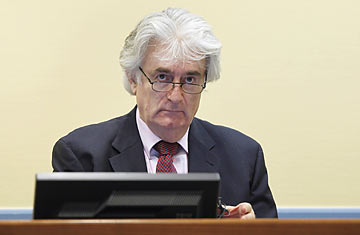
Former Bosnian Serb leader, Radovan Karadzic, looks up during his court appearance at the International Criminal Tribunal in The Hague, Netherlands.
Former Bosnian Serb leader Radovan Karadzic took the stand at his war crimes trial in The Hague this week to defend his dream of an independent Bosnian Serb state, calling his cause during the 1990s Bosnian war "just and holy." The war has been over now for 14 years, but in Bosnia, many fear the question of independence for the country's Serbs could be reopened, this time not with guns and bombs but with a referendum.
One of the provisions of the U.S.-brokered Dayton Agreement that ended the war in 1995 was that Bosnia would be split into two largely self-governing regions — the Federation of Bosnia and Herzegovina, made up mostly of Bosnian Muslims and Croats, and the Republika Srpska, made up mostly of Serbs. For years, the current leader of Bosnia's Serbs, Milorad Dodik, has vowed to hold a vote on the future status of the Republika Srpska. Now, as Bosnia lurches toward elections in October, it looks increasingly likely he'll make good on that threat, calling into question the future of a multi-ethnic Bosnia.
On Feb. 10, the Republika Srpska parliament passed a law creating the legal framework for holding a referendum. The thing that remains unclear, however, is what kind of referendum it would be — one that calls for independence outright, or one that asks a more veiled question. Many Bosnian Muslims, known as Bosniaks, say that doesn't matter — they see the mere act of holding a referendum as an intentional provocation. "It's meaningless in its substance," said Kurt Bassuener, of the Democratization Policy Council, a U.S.-based democracy advocacy group. "But the act is very meaningful." The Bosnian war, in fact, was sparked by a referendum on independence from Yugoslavia that was overwhelmingly supported by Bosniaks and Croats, but boycotted by Serbs.
Despite the bitter legacy of the war, Bosnia made strides in the first decade of its existence toward increased cooperation between the country's three ethnic groups and a greater centralization of powers. But in the run-up to the 2006 elections, the country saw a spike in nationalist rhetoric from both Bosniaks and Serbs — and the tenuous détente was derailed. This was when Dodik, who had previously been considered a moderate by many in the international community, began promising an independence referendum. Since that time, Bosnia has been virtually paralyzed.
The country's Serbs see the Republika Srpska as a guarantee of their rights in a state dominated by a Muslim majority. But for many Bosniaks and Croats, its very existence is an affront and a reminder of the success of Karadzic's campaign of ethnic cleansing. Reuf Bajrovic, a Sarajevo-based political analyst with links to the Social Democratic Party, the successor to the Communist Party and the closest thing Bosnia has to a multi-ethnic party, warns that Bosniaks and Croats would not accept partition. "The lesson is that ethnic cleansing is a legitimate form of state building," he says.
In recent interviews with both the Bosnian and Serbian press, Dodik has insisted that any referendum will not call for independence, but will instead address the "unlawful" role of the High Representative, who represents the international community in Bosnia and holds wide powers to overrule or enforce government decisions. But he has also left open the door for a future vote on the status of the Republika Srpska and repeatedly called into question the legitimacy and long-term future of Bosnia.
European and American diplomats say Bosnia's territorial integrity is not up for debate and have warned that any referendum risks inflaming the country's already shaky ethnic balance. "The international community will not tolerate any attempt to undermine the territorial integrity or sovereignty of Bosnia and Herzegovina," Valentin Inzko, the High Representative, emphasized last week after a meeting of the Peace Implementation Council, a body of 55 countries and agencies that still serves as the ultimate authority in Bosnia. In theory, Inzko has the power to cancel a referendum or remove any Bosnian politician from power — including those in the Republika Srpska. But it remains unclear whether he has the international backing for such a move, or if he acted, whether his authority would be respected in the Serbian enclave.
Zdravko Grebo, a professor of law at the University of Sarajevo, says the referendum issue highlights Bosnia's deeper structural problems. "The problem is Bosnia's actual legal and constitutional framework," he says. "Dayton is a peace accord, but it includes our constitution in Annex IV. ... I cannot recall an example in constitutional history where a peace accord has been changed." Grebo says the act of holding a referendum is not in itself unconstitutional and that all citizens have the right to express their views on issues of governance. But, he adds, that doesn't mean a referendum can call into question the Dayton Agreement or that any vote would necessarily hold the force of law.
Ultimately, says Grebo, a long-time campaigner for human rights and peaceful ethnic co-existence, the only secure future for Bosnia is through further European integration by joining the European Union and NATO. Most Bosnians agree. It's just the getting there that's difficult.
